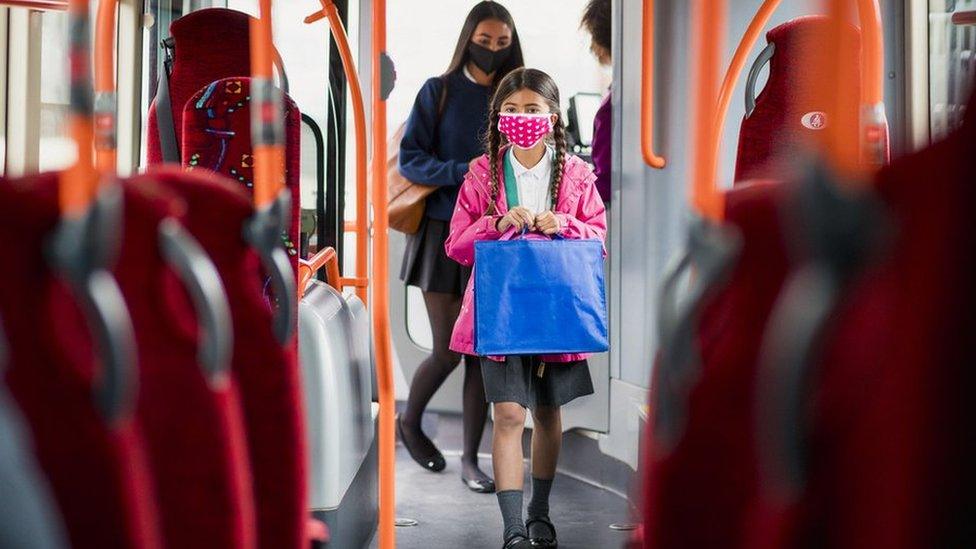Covid-19: New mask rules announced in England along with changes to travel
- Published
- comments

New face mask rules are coming into force in England, along with new travel measures for the whole UK
Secondary schools in England have been "strongly advised" to reintroduce mask wearing in shared areas from today.
Rules on mask-wearing are being made stricter across England, and new measures on travel into the UK are being introduced.
Face masks will, once again, be required in shops and on public transport from tomorrow, something already in place in Scotland, Northern Ireland and Wales.
PCR tests are required of anyone returning from abroad, and 10-day quarantine is being introduced for everyone arriving from a red list country.
Why are restrictions being reintroduced?
This in response to a new Covid-19 variant arriving in the UK, known as the Omicron variant.
Prime Minister Boris Johnson announced the changes in a press conference on Saturday.
Variants of a virus emerging are a normal thing but Boris Johnson says he is strengthening the rules to help keep people safe while experts study the new virus.
The Prime Minister said that the new rules are "temporary and precautionary" measures against the new strain of coronavirus.
The rule changes will be reviewed by the government in three weeks.
Currently, if you come into contact with someone with any of the earlier variants, you don't have to stay at home if you've had two vaccines.
However, anyone who is identified as a close contact of a person who has caught the new Omicron variant will have to self-isolate for 10 days, even if if they've been vaccinated .
What has changed?
Mask-wearing has not been a legal requirement in England since July.
However, the rules on wearing them are now coming back in secondary schools, shops and on public transport.
These new rules bring England in line with Scotland, Wales and Northern Ireland where they are also mandatory on public transport and in shops.
However people in England won't have to wear them in restaurants and cafes,
And some people are unable to wear masks for medical reasons. In these instances they are 'exempt' from wearing a mask - meaning they don't have to wear one.
Mr Johnson said more details will be announced soon by the health secretary.
Have the rules changed in schools across the UK?
In Scotland, masks are compulsory for all secondary school pupils and teachers whereas in Wales, they are still legally required in most public indoor spaces but not in schools.
In Northern Ireland, masks are compulsory on school transport for all secondary-age pupils, and it's "strongly recommended" by the Northern Irish government that they're worn in classrooms, although there's no law to say you have to. Primary school pupils don't have to wear them in schools but are advised to wear them on school transport.
Similarly, masks in secondary schools in England are now required when in communal, or shared, spaces. But there is still no requirement for primary school children to wear them.
What about travel?
In travel, everyone coming back to the UK from other countries will now have to take a PCR test by the end of the second day after their arrival.
They will also have to self-isolate until they receive confirmation that their test is negative.
PCR stands for polymerase chain reaction
The PCR test is what is used at your local testing centres
These are swab tests which need to be sent away to a laboratory, and provide a result usually within 24-48 hours
Why is this happening?
The prime minister announced the measures to target the spread of the new variant at Downing Street on Saturday
It's all because of a new strain (or variant) of coronavirus which has been named Omicron. This is a letter in the Greek alphabet, which is what scientists across the world are using to name new variants of Covid-19.
Finding a new variant of Covid-19 isn't unusual. The virus is constantly changing and adapting to its surroundings, so lots of strains have been discovered since we first came across the disease.
The reason rules are changing as a result of this new Omicron strain, is because scientists don't know enough about it yet, and the Prime Minister says he's being cautious and that putting these measures in place will allow experts to study the variant.
Boris Johnson explained at Saturday's press conference that, in his view, "we need to take targeted and proportionate measures now as a precaution while we find out more."
How long will these new measures last?
Members of Parliament still need to vote on the new rules, but if they are agreed upon, then they will last for at least three weeks.
PM Boris Johnson has said that at this point, they will review the measures and decide whether to relax them, tighten them, or keep them the same.
- Published29 August 2022
- Published25 January 2021
- Published13 March 2020
